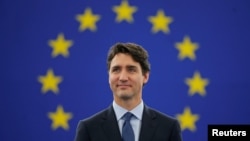Canadian Prime Minister Justin Trudeau advocated for free trade and a united Europe in a speech at the European Parliament in Strasbourg, France on Thursday.
The European Parliament voted in favor of CETA, the Comprehensive Economic and Trade Agreement, between the European Union and Canada a day earlier.
Trudeau highlighted the importance of the EU-Canada trade deal. “We know that in these times we must choose to lead the international economy, not simply be subject to its whims...If we are successful, CETA will become the blueprint for all ambitious, future trade deals. If we are not, this could well be one of the last.”
Globalization and free trade are being scrutinized on both sides of the Atlantic, with many citizens feeling that international trade deals only benefit the upper class and big corporations. Trudeau focused on the many similarities and shared values between the two economies throughout his speech.
EU Trade Commissioner Cecilia Malmstrom said in a statement that the EU vote sends a strong signal.
“By building bridges rather than walls, we can face the challenges that confront our societies together. In these uncertain times, with rising protectionism around the world, CETA underlines our strong commitment to sustainable trade.”
The European Parliament approved the agreement with 408 in favor, 254 against and 33 abstentions. While the vote was taking place, hundreds of protesters demonstrated in front of the parliament building.
The trade deal will slash more than 90 percent of tariffs between the EU and Canada when it takes effect later this year.
Trudeau visited Washington earlier this week and met with U.S. President Donald Trump. The U.S. leader has aired his reservations about global trade deals and wants to renegotiate NAFTA, a free trade agreement comprising the United States, Canada and Mexico.
Trump had also voiced his support for Britain to leave the EU while Trudeau told the European Parliament that “an effective European voice on the global stage is not preferable, but essential.”
The ratification of the CETA deal has been anything but smooth, with mass protests held around the continent in 2016. Demonstrators fear standards for consumer products will be reduced, are worried about the impact on the environment, and oppose the impact of secretive courts for disputes among investors and countries.
Proponents say the fears are unsustained and that the trade agreement will create more jobs and increase economic growth.
The CETA deal was set to be finalized last October after seven years of negotiations; but, Wallonia, a Belgian regional parliament, blocked the vote from moving forward. After several promises were made, Wallonia agreed but the battle for CETA is not over.
Wallonia’s prime minister, Paul Magnette, tweeted the following statement after the Wednesday vote:
“A reminder: Wallonia will not ratify #CETA until all the conditions we have met have been fulfilled.”
While most of the CETA deal can now be implemented, some controversial parts – such as the investor state dispute settlement courts and environmental consequences among others – are still to be decided because more than a dozen EU member states still need to have their national parliament ratify the deal.
Professor of European Affairs Hendrik Vos of Ghent University says there is only a small chance the CETA deal will fail. “The ratification process can take months, sometimes even years.
But that should not be a hindrance for the main parts of the deal to come into force when it comes to the trade aspect.”
Wallonia's leaders have said the region will only ratify the deal once the European Court of Justice has ruled on the legality of the investor state dispute settlement courts.







